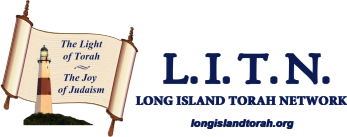This week's Torah Portion, Bo, opens with the eighth of the Ten Plagues: Locusts swarm over Egypt, blanketing the land and consuming any vegetation not already destroyed by the Hail.
The Ninth Plague is Darkness: for three days, the Egyptians are unable to see; for three more days they cannot even move. All the while, the Jews enjoy the light of day as usual.
Finally, Moses warns Pharaoh that the tenth and final Plague is at hand: at midnight on the Fifteenth of Nissan, G-d will pass through Egypt and smite the firstborn son in every Egyptian home. When this happens, Pharaoh and his people will beg the Jews to leave.
In preparation for this momentous Exodus, the Jews are given their first Mitzvah (commandment) as a nation: to follow a lunar calendar. This month, Nissan, shall be the first month. (Rosh HaShana, the Jewish New Year, actually falls in the autumn, in Tishrei, the seventh month; while Nissan, the first month, falls half a year later in the spring).
G-d also asks the Israelites to obtain valuables from their Egyptian neighbors, to fulfill the prophecy that "they will leave with great wealth." G-d induces the Egyptians to willingly hand over their valuables to the Jews.
Additionally, each Jewish family is to select a lamb, which they will slaughter and eat on that night. The blood of he lamb is to be smeared on the doorposts of the Jewish homes, and serves as a sign that G-d will "pass over" their homes and spare them during the Tenth Plague.
At midnight, the plague strikes. Egypt is in a uproar, and Pharaoh runs to Moses in the middle of the night, begging him to take his people and go. The Jews don't actually leave until the morning, but they leave in such haste that the bread they are baking has no time to rise, and turns into unleavened Matzah instead.
The Torah Portion concludes with a number of commandments that commemorate the Exodus, including the Tefillin, worn on the arm and head; the Mezuzah, placed on the doorpost; the Redemption of the Firstborn; and the retelling of the Exodus at the Passover Seder.
Click below to open a printable pdf
The Ninth Plague is Darkness: for three days, the Egyptians are unable to see; for three more days they cannot even move. All the while, the Jews enjoy the light of day as usual.
Finally, Moses warns Pharaoh that the tenth and final Plague is at hand: at midnight on the Fifteenth of Nissan, G-d will pass through Egypt and smite the firstborn son in every Egyptian home. When this happens, Pharaoh and his people will beg the Jews to leave.
In preparation for this momentous Exodus, the Jews are given their first Mitzvah (commandment) as a nation: to follow a lunar calendar. This month, Nissan, shall be the first month. (Rosh HaShana, the Jewish New Year, actually falls in the autumn, in Tishrei, the seventh month; while Nissan, the first month, falls half a year later in the spring).
G-d also asks the Israelites to obtain valuables from their Egyptian neighbors, to fulfill the prophecy that "they will leave with great wealth." G-d induces the Egyptians to willingly hand over their valuables to the Jews.
Additionally, each Jewish family is to select a lamb, which they will slaughter and eat on that night. The blood of he lamb is to be smeared on the doorposts of the Jewish homes, and serves as a sign that G-d will "pass over" their homes and spare them during the Tenth Plague.
At midnight, the plague strikes. Egypt is in a uproar, and Pharaoh runs to Moses in the middle of the night, begging him to take his people and go. The Jews don't actually leave until the morning, but they leave in such haste that the bread they are baking has no time to rise, and turns into unleavened Matzah instead.
The Torah Portion concludes with a number of commandments that commemorate the Exodus, including the Tefillin, worn on the arm and head; the Mezuzah, placed on the doorpost; the Redemption of the Firstborn; and the retelling of the Exodus at the Passover Seder.
Click below to open a printable pdf
| parsha_snapshot_bo.pdf | |
| File Size: | 148 kb |
| File Type: | |

